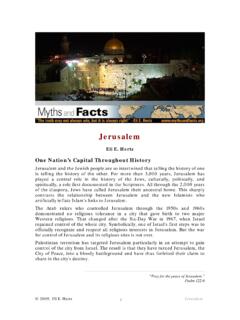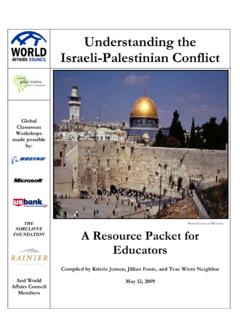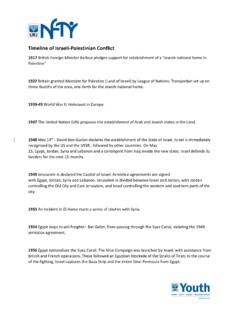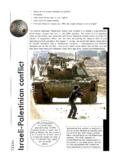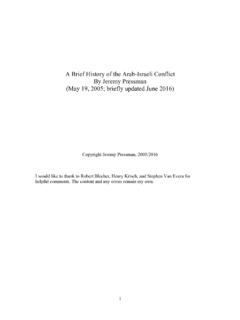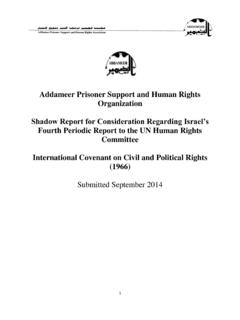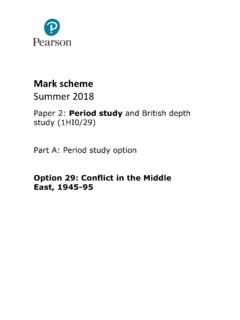Transcription of UN Resolution 181 – The Partition Plan - Myths and Facts
1 1 UN Resolution 181 The Partition Plan November 29, 1947 Eli E. Hertz In 1947 the British put the future of western Palestine into the hands of the United Nations, the successor organization to the League of Nations which had established the Mandate for Palestine. A UN Commission recommended partitioning what was left of the original Mandate western Palestine into two new states, one Jewish and one Arab. Jerusalem and its surrounding villages were to be temporarily classified as an international zone belonging to neither polity. What resulted was Resolution 181 [known also as the 1947 Partition Plan], a nonbinding recommendation to Partition Palestine, whose implementation hinged on acceptance by both parties Arabs and Jews.
2 The Resolution was adopted on November 29, 1947 in the General Assembly by a vote of 33-12, with 10 abstentions. Among the supporters were the United States and the Soviet Union, as well as other nations including France and Australia. The Arab nations, including Egypt, Syria, Iraq, and Saudi Arabia denounced the plan on the General Assembly floor and voted as a bloc against Resolution 181 promising to defy its implementation by force. The Resolution recognized the need for immediate Jewish statehood [and a parallel Arab state], but the blueprint for peace became a moot issue when the Arabs refused to accept it. Subsequently, realities on the ground in the wake of Arab aggression [and Israel s survival] became the basis for UN efforts to bring peace.
3 Aware of Arab s past aggression, Resolution 181, in paragraph C, calls on the Security Council to: Determine as a threat to the peace, breach of the peace or act of aggression, in accordance with Article 39 of the Charter, any attempt to alter by force the settlement envisaged by this Resolution . [Italics by author] The ones who sought to alter the settlement envisioned in Resolution 181 by force, were the Arabs who threatened bloodshed if the United Nations was to adopt the Resolution : The [British] Government of Palestine fear that strife in Palestine will be greatly intensified when the Mandate is terminated, and that the international status of the United Nations Commission will mean little or nothing to the Arabs in Palestine, to whom the killing of Jews now transcends all other considerations.
4 Thus, the Commission will be faced with the problem of how to avert certain bloodshed on a very much wider scale than prevails at present.. The Arabs have made it quite clear and have told the Palestine government that they do not propose to co-operate or to assist the Commission, and that, far from it, they propose to attack 2 and impede its work in every possible way. We have no reason to suppose that they do not mean what they say. [Italics by author] Arab s intentions and deeds did not fare better after Resolution 181 was adopted: Taking into consideration that the Provisional Government of Israel has indicated its acceptance in principle of a prolongation of the truce in Palestine; that the States members of the Arab League have rejected successive appeals of the United Nations Mediator, and of the Security Council in its Resolution 53 (1948) of 7 July 1948, for the prolongation of the truce in Palestine; and that there has consequently developed a renewal of hostilities in Palestine.
5 The conclusion: Having constituted a Special Committee and instructed it to investigate all questions and issues relevant to the problem of Palestine, and to prepare proposals for the solution of the problem, and having received and examined the report of the Special Committee (document A/364).. Recommends to the United Kingdom, as the mandatory Power for Palestine, and to all other Members of the United Nations the adoption and implementation, with regard to the future Government of Palestine, of the Plan of Partition with Economic Union set out below; [Italics by author]. In the late 1990s, more than 50 years after Resolution 181 was rejected by the Arab world, Arab leaders suddenly recommended to the General Assembly that UN Resolution 181 be resurrected as the basis for a peace agreement.
6 There is no foundation for such a notion. Resolution 181 was the last of a series of recommendations that had been drawn up over the years by the Mandatory and by international commissions, plans designed to reach an historic compromise between Arabs and Jews in western Palestine. The first was in 1922 when Great Britain unilaterally partitioned Palestine, which did not satisfy the Arabs who wanted the entire country to be Arab. Resolution 181 followed such proposals as the Peel Commission (1937); the Woodhead Commission (1938); two 1946 proposals that championed a binational state; one proposed by the Anglo-American Committee of Inquiry in April 1946 based on a single state with equal powers for Jews and Arabs; and the Morrison-Grady Plan raised in July 1946 which recommended a federal state with two provinces one Jewish, one Arab.
7 Every scheme since 1922 was rejected by the Arab side, including decidedly pro-Arab ones merely because these plans recognized Jews as a nation and gave Jewish citizens of Mandate Palestine political representation. Arabs rejected the unbalanced Partition Plan. The UN International Court of Justice (ICJ) uses the term unbalanced in describing the reason for Arab rejectionism of Resolution 181, which does not exactly fit reality. Seventy-seven percent of the landmass of the original Mandate for the Jews was excised in 1922 to create a fourth Arab state Trans-Jordan (today Jordan). In a statement by Dr. Abba Hillel Silver, the representative of the Jewish Agency for Palestine to the United Nations Special Committee on Palestine (UNSCOP), he had that to say about fairness, balance, and justice: According to David Lloyd George, then British Prime Minister, the Balfour Declaration implied that the whole of Palestine, including Transjordan, should ultimately become a Jewish state.
8 Transjordan had, nevertheless, been severed from Palestine in 1922 and 3 had subsequently been set up as an Arab kingdom. Now a second Arab state was to be carved out of the remainder of Palestine, with the result that the Jewish National Home would represent less than one eighth of the territory originally set aside for it. Such a sacrifice should not be asked of the Jewish people. Referring to the Arab States established as independent countries since the First World War, he said: 17,000,000 Arabs now occupied an area of 1,290,000 square miles, including all the principal Arab and Moslem centers, while Palestine, after the loss of Transjordan, was only 10,000 square miles; yet the majority plan proposed to reduce it by one half.
9 UNSCOP proposed to eliminate Western Galilee from the Jewish State; that was an injustice and a grievous handicap to the development of the Jewish State. [Italics by author]. Following passage of Resolution 181 by the General Assembly, Arab countries took the dais to reiterate their absolute rejection of the recommendation and intention to render implementation of Resolution 181 a moot question by the use of force. These examples from the transcript of the General Assembly plenary meeting on November 29, 1947 speak for themselves: Mr. JAMALI (Iraq): .. We believe that the decision which we have now taken .. undermines peace, justice and democracy.
10 In the name of my Government, I wish to state that it feels that this decision is antidemocratic, illegal, impractical and contrary to the Charter .. Therefore, in the name of my Government, I wish to put on record that Iraq does not recognize the validity of this decision, will reserve freedom of action towards its implementation, and holds those who were influential in passing it against the free conscience of mankind responsible for the consequences. Amir. ARSLAN [Syria]: .. Gentlemen, the Charter is dead. But it did not die a natural death; it was murdered, and you all know who is guilty.

